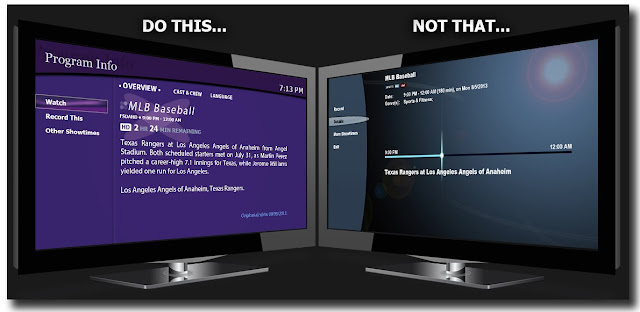And that’s appropriate. Because if your sports TV listing
data isn’t up to the very last second, you’re not going to be winning very
often. How’s that for a segue?
You see, the special aspects of sports that make it so
timely—games every day, tournaments, league standings, etc.—should be reflected
as often as possible in an EPG in order to convert and keep sports fans that
want to view their particular brand of program. Sports fans are ravenously enticed
or stimulated by the associated information that plays such an important part
of sports.
Here are five ways failing to keep sports TV listings
accurate, specific, and up-to-date could have you playing in the minors.
1. Undisputed
heavyweight champion of having a low sports I.Q.
When a guide isn’t aware of the importance of a game, the teams playing, if
it’s a tournament or a league game, or even if it’s the playoffs, that says
something to the big sports fan. It says, “We’re not paying all that much
attention to sports, sports fan.”
More robust information is critical to a sport fan’s viewing
habits, and to your bottom line. When sports fans are the ones who’ll
potentially be paying for special pay-per-view events and viewing packages,
showing your sports mastery becomes very relevant. And, if you’re not showing
off that mastery, you may be neglecting to include information that could drive
serious viewers to watch.
Like a player who is going for a record. Or the fact that
the last time the two teams met, they set a new scoring record. Or a number of
other facts.
And, even a casual sports fan will have a general idea of
how the local team is doing. Properly presented, the team’s standings could
actually generate increased interest inside an EPG, while that viewer is more
receptive than ever to watching something of interest.
Then, there’s this example. (Just click on the images to blow them up to a larger size for your review.) On one hand, we have a complete,
full, and glowing description of the ESPN documentary on Sheryl Swoopes
(demonstrating a fine sports IQ.) And then on the other hand, we have…
Absolutely nothing. And that’s what a viewer will use to
make their choice.
2. All-Star confusion—do
they even have my sports program?
If a sporting event (a tournament game, a race series, or even a playoff
game, for example) doesn’t have up-to-date information—or, if the titling of
the event isn’t specific—then, the viewer may not realize it’s the event they
want. Or, they might just wonder whether a certain channel even has their
event.
Because of the proliferation of sports and sports channels,
it’s easy to wonder whether your particular event is elsewhere—unless the
information is up-to-date and specific.
In our example, we see that on one hand, the program has
been appropriately defined so that the generic title of “Texans” has been
attributed to the NFL team. In the other example, since the genre is “Sports
& Fitness” one could mistake this for an exercise program aimed at
residents of the Lone Star State. Here, opportunity has been missed to
accurately and completely define the program’s content in the mind of the
potential viewer.
And that won’t win in any league.
3. Gold medal lack of
context.
NEWS FLASH: Tournaments and playoffs are winner-specific things.
So, when people are trying to decide what to watch—knowing
who’s playing at what stage of a tournament or a playoff is simply
indispensable information. Without it, a viewer can watch a channel and not
know whether they’re watching a past tournament, a replay of a previous game
from the current tournament, or something else altogether.
What’s playing on the screen should match what’s in the
guide as closely as possible—so the potential viewer can make the most informed
decision possible.
 Our good example in this case gives appropriate leaderboard
information updated from the previous round. In our not-so-good example, a
laundry list of “potential” competitors has been given with no inkling as to
the competitive stage for that day’s play whatsoever.
Our good example in this case gives appropriate leaderboard
information updated from the previous round. In our not-so-good example, a
laundry list of “potential” competitors has been given with no inkling as to
the competitive stage for that day’s play whatsoever.
Which means our bad example will, yet again, be taking a
mulligan.
4. Record-breaking
strikeout on current events.
The most immediate sports information—when incorporated into a guide—can actually drive viewing. If a player set a record for strikeouts, or is going for one, that’s important information which could drive viewers.
The most immediate sports information—when incorporated into a guide—can actually drive viewing. If a player set a record for strikeouts, or is going for one, that’s important information which could drive viewers.
If two teams are vying for the last playoff spot, or if one
team just completed a historic upset, or if one of the players in a golf
tournament hit three holes-in-one the previous day, it might be a good idea to
mention it in the guide.
Because it’s sports—constantly timely, constantly updated,
and voraciously followed. Good sports content—as timely and relevant as possible—makes
it easier for sports viewers to keep on viewing.
For instance, our good example sets the stage for that
sporting event’s viewing with result information from a previous meeting between
the two starting pitchers. This gives the viewer a context by which to judge
whether they want to view the program—allowing them to make an INFORMED decision.
The bad example screen? Sadly, it’s pretty self-explanatory
without saying much of anything.
5. Hall of Fame oblivion
to fan chatter.
Whatever “the buzz” is in the world of sports, that’s the kind of stuff that should be in a well-updated EPG or print listings guide. Well beyond the material facts of a sporting event.
Whatever “the buzz” is in the world of sports, that’s the kind of stuff that should be in a well-updated EPG or print listings guide. Well beyond the material facts of a sporting event.
Our good example shows just the kinds of things fans will
chatter about before a game. And, it makes use of the big-name players and
announcers to draw even more fan interest. The bad example simply lists the
game, the teams, plus where the game is being played.
And that’s just not championship caliber.
As we mentioned before, sports is constant. Constantly
changing, constantly updated, constantly surprising, constantly refreshed with
new stories and headlines each and every day.
The big stories in sports all come with their very own
inherent controversies, philosophies, and schools of thought. They’re rabidly
debated and considered amongst sports fans. That’s part of what makes a lot of
people a sports fan in the first place.
Sports TV listings that are up-to-date. Relevant. With information that drives sports viewing.
If your EPG contains this kind of information, that’s a
winning combination. If not? Well, you’re not GUARANTEED to lose that viewer,
but let’s just say you’re not giving yourself the best possible chance to win.
Just click below and FYI will demonstrate championship
teamwork, coach.












Post a Comment